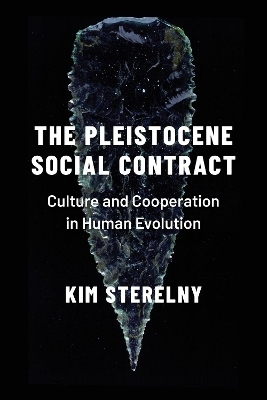
The Pleistocene Social Contract
Oxford University Press Inc (Verlag)
978-0-19-753138-9 (ISBN)
First, he proposes a new model of the evolution of human cooperation. He suggests human cooperation began from a baseline that was probably similar to that of great apes, advancing about 1.8 million years ago to an initial phase of cooperative forging, in small mobile bands. Second, he then presents a novel account of the change in evolutionary dynamics of cooperation: from cooperation profits based on collective action and mutualism, to profits based on direct and indirect reciprocation over the course of the Pleistocene. Third, he addresses the question of normative regulation, or moral norms, for band-scale cooperation, and connects it to the stabilization of indirect reciprocation as a central aspect of forager cooperation. Fourth, he develops an account of the emergence of inequality that links inequality to intermediate levels of conflict and cooperation: a final phase of cooperation in largescale, hierarchical societies in the Holocene, beginning about 12,000 years ago.
The Pleistocene Social Contract combines philosophy of biology with a reading of the archaeological and ethnographic record to present a new model of the evolution of human cooperation, cultural learning, and inequality.
Kim Sterelny is an Australian philosopher, by birth, training, and inclination, who has worked mainly in Australia and New Zealand, with occasional visiting posts in North America and the UK. He has always worked on the intersection of philosophy and the natural science. In the last two decades, he has focused primarily on the life sciences, and increasingly on hominin evolution.
Contents
Preface
I. Building Cumulative Culture
1.1 Methodological Preliminaries
1.2 Culture and Cooperation
1.3 The Prehistory of an Unusual Ape
1.4 The Growing Footprint of Cultural Learning
1.5 Cumulative Cultural Learning.
1.6 Adapted Minds and Environments
1.7 Overview
II. The Pleistocene Social Contract
2.1 Free-riders and Bullies
2.2 Curbing Dominance Hierarchies
2.3 An Economy of Reciprocation
2.4 Making Reciprocation Work: Gossip
2.5 Making Reciprocation Work: Norms
2.6 Making Reciprocation Work: Ritual
2.7 Stabilising Cooperation
III. Cooperation in a Larger World
3.1 Cooperation between Bands
3.2 The Origins of an Open Society
3.3 Cooperation, Culture and Conflict
3.4 Individual Selection, Group Selection and Cultural Group Selection
IV. Cooperation in Hierarchical Communities
4.1 The Puzzle of Farming
4.2 Cooperation in an Unequal World.
4.3 Religion, Ritual and Ideology.
4.4 Conflict, Hierarchy and Inequality
Epilogue: Why Only Us?
| Erscheinungsdatum | 29.04.2021 |
|---|---|
| Verlagsort | New York |
| Sprache | englisch |
| Maße | 142 x 211 mm |
| Gewicht | 363 g |
| Themenwelt | Naturwissenschaften ► Biologie ► Humanbiologie |
| ISBN-10 | 0-19-753138-5 / 0197531385 |
| ISBN-13 | 978-0-19-753138-9 / 9780197531389 |
| Zustand | Neuware |
| Informationen gemäß Produktsicherheitsverordnung (GPSR) | |
| Haben Sie eine Frage zum Produkt? |
aus dem Bereich


